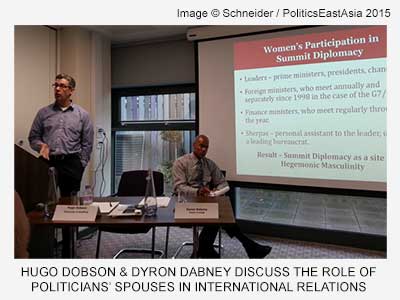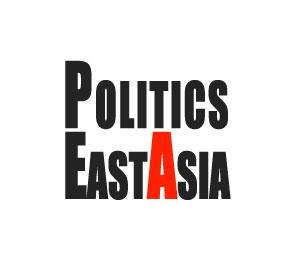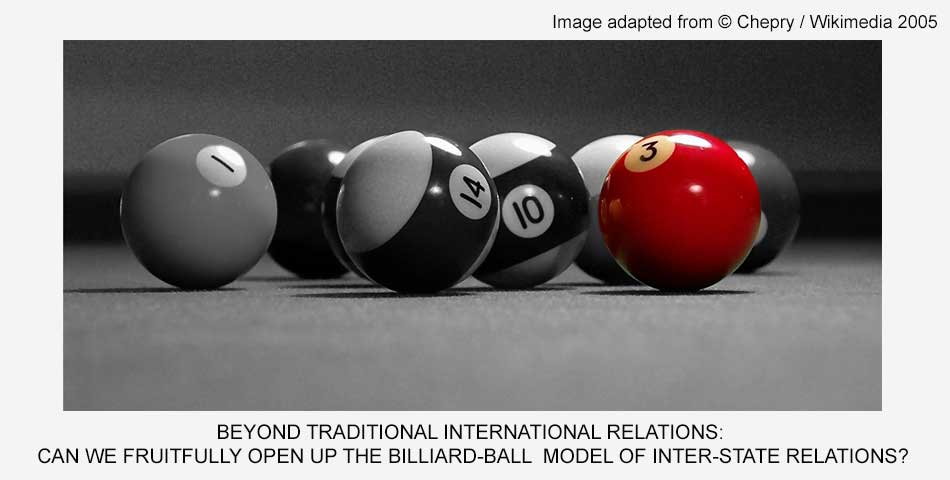Who Shapes International Politics?
Thoughts on the conference “Informal Political Actors in East Asia, Russia and the Arab World” at Sheffield University
The study of international relations is mostly concerned with how states interact. In mainstream IR, it is common to treat nation-states as persons (Went 2004), and to ask questions like: what does America “want”? What will China “do”? What does Japan “think”?
This strong focus on governments has its advantages. It provides the building blocks for elegant theories of international politics, in which states are much like billiard balls: solid objects that are moved about by external forces and by their interaction with each other. Such a model points towards useful sources for understanding IR (official declarations, government budgets, etc.), and it allows for relatively straight-forward policy advice. It has also, however, been the source of increasing dissatisfaction for scholars working outside of IR’s mainstream. This dissatisfaction stems in part from the realization that international relations are a complex affair in which many different actors come together to shape politics by negotiating, collaborating, manipulating, coercing, and convincing their way through a myriad of dynamic, multi-layered issues. Can IR scholarship afford to ignore this complexity?
This was the question at the heart of the recent conference on “informal political actors” that I had the pleasure to attend at the University of Sheffield on 16 January 2015. Bringing together a great team of international scholars, the organizers at the School of East Asian Studies put together a programme full of thought-provoking arguments. A short blog post can hardly do justice to all of the nuances of this event, so instead of providing a full summary, I will discuss three issues that I thought connected most directly with my own concerns about how to bring the study of IR into the 21st century (Schneider 2014): the influence of non-official political actors, the importance of the political economy, and the structural relevance of meanings that are circulated through advanced media technologies.
Political actors off the beaten track
When we think of political actors, we usually think of governments. Even in studies that break down the collective agency of nation-states to focus on the detailed bureaucratic politics that shape decision-making, the main actors are normally still state officials like prime ministers, presidents, foreign ministers, or ambassadors. But what happens outside these traditional corridors of power?
Take the case of retired officials. Former statesmen, for example, are an important part of how US influence extends to countries abroad. Think only of Jimmy Carter‘s role in conflict resolution, or Henry Kissinger’s activities in China, for examples of how the power of state officials does not end after their term in office. In other contexts, such influence might be less institutionalized than in the US (e.g. in Russia or Japan), or it might play out behind closed doors (e.g. in China). In each case, however, many of those who once officially represented the state continue to shape how international relations work, as Caroline Rose has shown for the case of Sino-Japanese relations.
Another group that is often overlooked in IR is the spouses and partners of leading politicians. In China, Peng Liyuan, the wife of President Xi Jinping, has received arguably as much attention in the press and in popular media as her husband. When Xi met with Obama in California in 2013, a significant part of the public discourse surrounding the event was reserved for discussions of why Michelle Obama was not going to meet with China’s “first lady”. A year later, during the 2014 APEC summit, China’s social media was buzzing with discussion of whether Russia’s president had committed a diplomatic faux-pas when he offered a blanket to Peng during an outdoor event.
 First ladies matter, as Hugo Dobson has shown in his study of unofficial diplomacy at important summit meetings like the G8 and G20 (Dobson 2012). Yet there isn’t enough discussion of how these informal actors are linked to international politics, and in particular what role gender plays in this context. It is telling, for instance, that the wives of leaders are often discussed in terms of what they wear or what charity event they attend. I am not aware of similar discussions regarding the attire or business schedule of Angela Merkel’s husband, for example. Even though the spouses of politicians tend to play a range of diverse political roles, as Dyron Dabney has shown in his research on Japan, these roles tend to be shaped by very specific gender perceptions: male politicians are accompanied by their demure wives, and female politicians by their supportive husbands, even when the reality behind the scenes is often vastly more complex.
First ladies matter, as Hugo Dobson has shown in his study of unofficial diplomacy at important summit meetings like the G8 and G20 (Dobson 2012). Yet there isn’t enough discussion of how these informal actors are linked to international politics, and in particular what role gender plays in this context. It is telling, for instance, that the wives of leaders are often discussed in terms of what they wear or what charity event they attend. I am not aware of similar discussions regarding the attire or business schedule of Angela Merkel’s husband, for example. Even though the spouses of politicians tend to play a range of diverse political roles, as Dyron Dabney has shown in his research on Japan, these roles tend to be shaped by very specific gender perceptions: male politicians are accompanied by their demure wives, and female politicians by their supportive husbands, even when the reality behind the scenes is often vastly more complex.
Finally, there are the many intellectuals, artists, and public figures who voice their opinions on matters of international affairs or who work in an international setting. This includes people like Noam Chomsky or Paul Krugman, who shape public perceptions through their presence in global media. It also includes famous dissidents (like the Chinese artist Ai Weiwei), professionals whose activities have moved them into the international lime-light (such as the blind human rights lawyer Chen Guangcheng), or celebrities with a cause (like Hollywood actress Angelina Jolie or Shanghai race car driver and blogger Han Han). Finally, it includes the many intellectuals who provide policy advice. In the US, Joseph Nye is a prominent example, but similar examples abound in East Asia, Russia, or the Middle East, as research by Steve Tseng, Misato Matsuoka, Adrian Campbell and Elena Denezhkina, or Juliette Harkin shows. An open question in this regard remains how these actors are related to the state and its official representatives, particularly in societies like China’s, where the fault lines between “official” and “unofficial” are not always clear, and where many public intellectuals work within rather than outside of the political establishment (what in Chinese is called tizhinei).
The machinery of commerce
Particularly the role of celebrities in politics raises an additional question: how do commercial considerations shape the actions of informal political actors? However we may feel about the charity work and political activism of Madonna, George Clooney, or Russell Brand, their activities are not divorced from their vast wealth, their visibility as cultural icons, and industry concerns about their value as “brands”.
Andrew Cooper (2007) has provided an insightful discussion of this broader political economy of celebrity activism. For an example from East Asia, consider the Japanese adult film star Sora Aoi. As Jamie Coates (2014) has shown, Sora Aoi has become a symbol in transnational cultural flows across Asia, and her cultural and commercial “meaning” varies in subtle ways between Japan, China, Korea, or Thailand. When this former porn star became involved in discussions about Sino-Japanese territorial disputes (she had tweeted calligraphy messages that promoted Sino-Japanese friendship), she became a “trending topic” in East Asia. She also quickly came up against the constraints of overlapping industry interests, public opinions, and PR considerations. Following a sexually charged and highly aggressive backlash against her public activities in both China and Japan, it is not too surprising that her political media presence today has become scaled-down: her value as an upcoming soap star and singer is best served by an apolitical public presence, not by forages into the minefields of Sino-Japanese political discourses.
But you do not need to be a movie star to be influenced by the power of capitalism. Public intellectuals have to worry about book sales. Former politicians rake in honorariums for public appearances. Researchers relying on government grants have to consider the “impact” that their work will have on policy-making. And all of these actors sit within a web of other actors, who each again rely on the profits that such work generates: agents, publicists, publishers, managers, event organizers, advertisers… these complex commercial linkages raise the question whether we can treat the public personas of Sora Aoi or George Clooney, of Haruki Murakami or Mo Yan, of Yan Xuetong or Paul Krugman, as individual actors at all.
And then there is the industry of think-tanks. The idea of (often partisan) institutions that analyse politics and provide professional policy advice is not just a feature of Washington’s political landscape, though that is arguably where the political economy of this system is most developed. In East Asia, such institutions are playing increasingly important roles in shaping politics, for instance in China, where institutes like the Chinese Academy of Social Sciences or the China Institute of International Studies are continuously negotiating their role between political and commercial imperatives. How exactly these actors influence decision-making at the top of China’s political structure remains murky (even to these actors themselves), but as Sebastian Maslow and Pascal Abb have shown, they are becoming notable producers of public discourse.
Making meanings in complex media environments
This, then, is the third argument that I am taking away from this conference: that it may not normally be possible to prove conclusively how informal political actors “cause” specific official policy decisions, but that these informal actors visibly and demonstrably contribute to the wider frameworks of meanings in which political decision-making takes place. Think tanks, celebrities, and renown academics all matter because they shape how societies make sense of complex political issues. When a Chinese academic like Zhao Tingyang successfully starts a discussion about the philosophical framework that should be used to make sense of China’s role in the world today, he adjusts the parameters of political discussion in meaningful ways (Callahan 2008). When a celebrity like Sora Aoi posts political calligraphies on Chinese social networks, she shapes perceptions of who speaks for “Japan”.
Political decision-making is always embedded in complex frameworks of meanings. How decision-makers view a problem, how they attempt to solve the problem, and how they justify their actions is intimately linked to shared knowledge and the cultural resources available in a society. But who has the power to shape these resources? Who creates, manipulates, and promotes knowledge, for instance about modern history? Who is in a position to sell certain arguments or viewpoints as self-evident “common-sense”? Who is able to infuse a decision-making process with a particular set of values? In some cases, this power may lie with the informal networks of academic elites, of former politicians, or of celebrities. In other cases, it may lie with official state institutions that try to manage culture, often indirectly and in collaboration with commercial actors. Tracing such processes is one of the great challenges that confronts political science research, particularly in an age of advanced information and communication technologies.
What to make of all this
The research that came together at this conference on informal political actors shines a spotlight on the aspects of IR scholarship that deserve more attention. As the various contributors have shown, there is an opportunity to reconsider and further develop the theoretical assumptions that inform IR. What is more, there is a need to consider non-traditional sources for research. As important as policy documents, speeches, government expenditures, or military movements are, there is much to be learned from oral histories and informal interviews, from popular culture and commercial sales, from personal networks and the spread of ideas.
Personally, I suspect that we will see a lot more research that will make use of digital technologies to trace and map out the way in which informal politics shape the world we live in: analyses of social networks, of large corpora of texts or images, and of vast relational data indeed promise to open up areas for research that have until very recently remained too complex to study. But more important than these advances in research methods are the questions we ask. If the nuanced and careful discussions of this Sheffield conference are any indication, we can look forward to profound and exciting shifts of how 21st century politics are studied.
References
Callahan, William (2008), ‘Chinese Visions of World Order: Post-hegemonic or a New Hegemony?’. International Studies Review, 10, 749-761.
Cooper, Andrew F. (2007), Celebrity Diplomacy. Boulder, CO: Paradigm Publishers.
Coates, Jamie (2014), ‘Rogue Diva Flows: Aoi Sola’s Reception in the Chinese Media and Mobile Celebrity’. Journal of Japanese and Korean Cinema, 6/1, 89-103.
Dobson, Hugo (2012), ‘Where Are the Women in Global Governance? Leaders, Wives and Hegemonic Masculinity in the G8 and G20 Summits’. Global Society, 26/4, 429-449.
Schneider, Florian (2014), ‘Reconceptualising World Order: Chinese Political Thought and Its Challenge to International Relations Theory’. Review of International Studies, 40/04, 683-703.
Wendt, Alexander (2004), ‘The State as Person in International Theory’. Review of International Studies, 30/02, 289-316.


